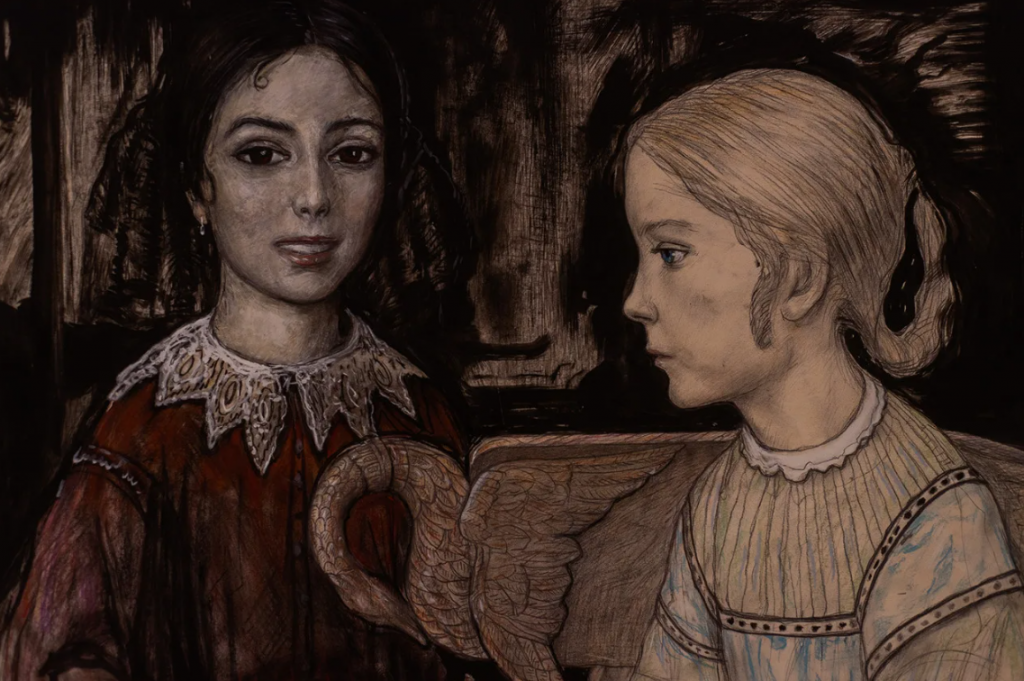
11.01.2023
This work by F. M. Dostoevsky was first published in the “Domestic Notes”, 1849 (January – February, May), under the title “Netochka Nezvanova. The story of one woman.”
Dostoevsky worked on the story for more than two years and pinned special hopes on him.But the complete failure of the Hostess, unexpected for him, and Belinsky’s sharply negative review deeply disturbed Dostoevsky, greatly hurt his pride. And with even greater enthusiasm, he turns all his hopes to “Netochka Nezvanova”. At the beginning of February 1849 he writes to the publisher of “Domestic Notes” Kraevsky: “Because I, in order to fulfill my word and deliver it on time, raped myself, wrote, among other things, such bad things or (in the singular) such a bad thing as “Mistress”, thereby fell into perplexity and self–abasement and for a long time afterwards I couldn’t get together to write a serious and decent one. Each of my failures produced a disease in me… I know very well, Andrey Alexandrovich, that the first part of Netochka Nezvanova, which I printed in January, is a good work, so good that “Fatherland. notes”, of course, without shame can give him a place. I know that this work is serious. I say, finally, it’s not me, but everyone is talking.” In this case, Dostoevsky was not mistaken. “Netochka Nezvanova” really promised to be a great and significant work of a young author.
Parts of the work
In the magazine edition, “Netochka Nezvanova” consisted of three parts: “Childhood”, “New Life” and “Mystery”. Dostoevsky’s arrest in the Petrashevtsev case interrupted his work on this work, which remained unfinished. When preparing for the publication of the collected works of 1860, bearing in mind that there would be no continuation of the “Netochka”, Dostoevsky made significant changes to the journal text. He turned the beginning of a great novel into a story about the childhood and adolescence of Netochka Nezvanova. Therefore, the division into parts disappeared, a general numbering of chapters appeared. In comparison with the magazine text, an episode was excluded (after the words: “… knowing that I won’t bother anyone there”), in which Netochka’s acquaintance with the orphan boy Larey, adopted by the prince for upbringing, was depicted. The fate of poor Larry is in many ways similar to the fate of Netochka herself: “His father died of grief, and his mother from despair that she lost her husband. Both of them died in the same week. But by some strange idea, by some unhappy conviction, Larya imagined that they had died, apart from chagrin, and because he did not love them; the poor orphan has since tortured himself with remorse, reproaches and restored his conscience to himself. The most terrible thing is that he kept his conviction a secret and that there was no one to dissuade him during the whole year of his orphanhood, so that an evil thought took deep roots in him and made God knows what out of a child.

Yes, in addition, there were other reasons that contributed to its rooting. With tears in his eyes, poor Larya proved to me what an insensitive boy he was, and did not listen to my dissuasion. He was particularly struck, as it was evident from his own words, why he did not love his father and mother during their lifetime and only after their death guessed, poor thing, how dear they were to him! From all his stories it was clear, however, that the poor thing was too cute and impressionable, even beyond his years, that he loved his parents with the most ardent love; but his conviction was incurable! He told me how his parents were poor, how they used to spend whole evenings talking about some insignificant penny, and everyone gasped, everyone complained and counted on how to make something, make something… Larya brought a lot of facts that both he and I already understood, despite the fact that both of us were not at such an age to understand what interests many people are fighting for in the world” (“Fatherland Notes”, 1849, January – February, pp. 316 – 317).
In the story of Lari, the character of the poor official Fyodor Ferapontovich, who sheltered the boy after the death of his parents, is remarkably vividly outlined. Fyodor Ferapontovich belongs to those “downtrodden people” whose psychology Dostoevsky profoundly showed already in his first works. “He wasn’t evil; but whether it was because he was offended, humiliated by someone and there was some secret enemy who continuously insulted his vanity, or simply because Fyodor Ferapontovich was a wonderful man, but unfortunately he took his last quality very close to his heart – only he, for lack of listeners and admirers, he was extremely fond of talking incessantly in his home, to his wife and even to young children, whom he kept in respectful awe, about what a good, wonderful man he was, what services he had rendered to society, what enemies he had made and how little he had reaped… I don’t remember what, but I speak his style. When he spoke in this way, he would feel so much from self-indulgence and adoration that he would even cry and would certainly end up with some most spectacular trick: either he would open his robe, open his chest and, exposing it to his invisible enemies, say: “Strike!” or, addressing small children, ask them in a menacing, reproachful voice: what have they done for all the benefits he has shown them? did they reward him with a good study and pronunciation of the French language for all the sleepless nights, for all the work, for all the blood, for everything, for everything?.. In a word, Fyodor Ferapontovich, having sketched completely, began to take out on all the household the incomprehensible indifference of people and society to his family and civic virtues and made a little hell out of his house every evening” (ibid., p. 319).
Further, it was said about Fyodor Ferapontovich: “… this is not the last time he appears on the pages of my story. His turn is ahead” (ibid., p. 320).
Thus, having decided not to continue the “Netochka Nezvanova”, Dostoevsky excluded that part of the narrative where new faces were introduced in the hope of further development of the plot. Of the other abbreviations of the text made by Dostoevsky in 1860, the following is the most interesting. After the words “… leaning on the fireplace and holding my head tightly with both hands”, the lines are crossed out: “At that moment something hot burned my hand. I looked at Pyotr Alexandrovich and shuddered with amazement: tears were rolling down both his cheeks. His whole face depicted deep suffering.” So Dostoevsky consistently deprived the image of Peter Alexandrovich of any shade of nobility.




